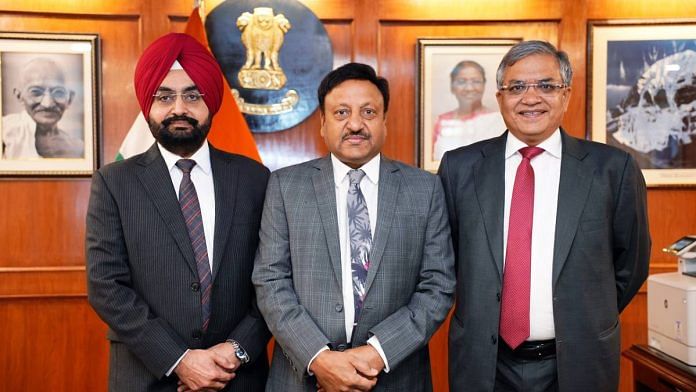New Delhi: Opposing a batch of pleas against the appointment of two new election commissioners, the Centre filed an affidavit in the Supreme Court Wednesday defending its move.
The affidavit says that the credentials of the people appointed to the post of election commissioner have not been called into question.
“Instead, a political controversy is sought to be created only on the basis of bare, unsupported and pernicious statements about certain vague and unspecified motives behind the appointment,” it says.
The court is hearing applications filed by Congress leader Jaya Thakur and the Association for Democratic Reforms (ADR) against the appointment of election commissioners under the Chief Election Commissioner and Other Election Commissioners (Appointment, Conditions of Service and Term of Office) Act, 2023.
The ADR had filed an application on 11 March this year, requesting the Supreme Court that the two election commissioners’ vacancies be filled using the process suggested in the court’s judgment of March 2023, because this new law for their appointment is under challenge before the Supreme Court.
However, Gyanesh Kumar and Sukhbir Singh Sandhu were appointed as election commissioners on 14 March, before the application could come up for hearing. They were appointed in accordance with the act.
On 15 March, the court did not issue any order against the law or with respect to the latest appointments.
In its reply to the petitions, the Centre has highlighted the magnitude of the upcoming general elections in India, calling it the “largest-ever electoral exercise in the world”. It has said that political parties require some time to prepare for elections after declaration of the schedule for the national general elections.
“Keeping in mind the ensuing National General Election of such wide magnitude, geographical width and amplitude and simultaneous elections of four states, it would have been humanly not possible for one Chief Election Commissioner to discharge his functions alone,” says the Centre’s affidavit.
Therefore, it asserts, the two new election commissioners were appointed on 14 March this year.
The appointments were made according to the 2023 Act, passed in December last year. The law had overturned a Supreme Court order of March last year, when a five-judge Constitution Bench had modified the process for appointing members of the Election Commission of India (ECI).
The court had held that a committee comprising the prime minister, the leader of the Opposition and the Chief Justice of India (CJI) would advise the President on ECI appointments. But the Chief Election Commissioner and Other Election Commissioners Act took the CJI out of the equation.
According to the act, the Chief Election Commissioner and other Election Commissioners will be appointed by the President upon the recommendation of a selection committee comprising the PM, a Union cabinet minister, and the leader of the Opposition/leader of the largest opposition party in the Lok Sabha.
Also Read: EC appointments: SC says it’s a ‘myth’ court can’t make law, no strict separation of powers in India
Centre rebuts claims
During the hearing on 15 March, the petitioners had orally remarked that the meeting for the selection of the Election Commissioners was brought forward while the hearing of their (petitioners’) application remained pending.
In its response, the Centre has pointed out that the meeting was advanced (to 14 March from 15 March) on 9 March, before the filing of the stay applications.
“The petitioner has wrongly suggested that the meeting scheduled for 15.03.2024 was preponed to 14.03.2024 after the filing of the IA (application),” it says.
The petitioners had also contended that the 2023 act was violated when the “minority” member of the selection committee and leader of the largest opposition party, Adhir Ranjan Chowdhury, recorded his dissent and questioned the procedure followed. He told The Indian Express that the government shared with him the names of six shortlisted candidates just “eight to 10 minutes” before the meeting started.
The Centre, however, submits in its affidavit that “the list of shortlisted persons was made available to the leader of the single largest party in the Opposition as soon as practicable after the search committee had finalised six names for recommendation to the selection committee.”
‘Significant improvement’
The Centre’s affidavit states that the 2023 Act “is a significant improvement on the status quo existing and provides for a far more democratic, collaborative and inclusive exercise for appointment of Election Commissioners”. It contends that the mechanism evolved by the court was “to last only till the time Parliament made a law on the subject”.
The affidavit further asserts that “a stay on appointments of constitutional functionaries cannot be granted simply for the asking”.
Defending its move, the Centre has also submitted that the “presence of senior government functionaries on the Selection Committee cannot in and of itself be a ground to automatically assume bias on behalf of the committee.”
“It is submitted that the high constitutional functionaries ought to be presumed to act fairly and in good faith in the public interest,” it says, adding that the “independence of the Election Commission, or any other organisation or authority, does not arise from and is not attributable to the presence of a judicial member in the Selection Committee”.
According to the affidavit, the “allegations of disingenuous motive and premeditation on the part of the government are wholly without basis”.
The response asserts: “It is clear that the impugned enactment adequately protects the high constitutional institution of the Election Commission, (and) creates a far more democratic and participative statutory mechanism for the functioning of the Commission.”
(Edited by Nida Fatima Siddiqui)



